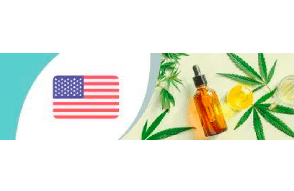“CBD is an integral part of my training and post-fight regimen expediting my body’s natural healing process.” – Anthony Pettis
The way CBD demand is growing gradually worldwide, this substance is likely to be one of the wealthiest business types in the forthcoming years. As per the U.S. consumer sales of CBD (cannabidiol), this market is expected to reach 1.8 billion U.S. dollars profit by the end of 2022.
With this, the overall projected sales of legal cannabis in the United States are likely to hit 23 billion U.S. dollars by 2025 end. This unexpected growth rate is enough to have a sound idea of its consistent growth and demand worldwide. And why not when it offers you so many perks?
It’s common to think about why CBD is in demand? The clear reason is multiple medicinal perks, including- healing different neurological disorders, calming body and mind, fighting back inflammation issues, and much more.
Additionally, the legalization of recreational CBD in up to 19 states in the United States of America accelerated its demand tremendously. Let’s get into the details-
CBD legalization – A revolutionary remark
On 2012 Election Day, most voters in Colorado approved a ballot initiating the legalization of cannabis sales and consumption. With this, Colorado became the first state in the U.S.A to legalize this substance for recreational purposes.
The U.S. follows different CBD-related cultivation laws, making it essential for every individual to explore and follow relevant legal protocol. One of the biggest examples is New York and California permitting people to use cannabis plants and their extracts.
Besides, other states including Maryland and Hawaii have approved the request of cannabis growing for different recreational purposes. Later, the 2014 Farm Bill legalized its consumption and sales completely. Such factors make it essential for every individual to know about the states you can grow weed legally. Let’s take you through a detailed list of states permitting its usage for recreational purposes
- Washington
- Colorado
- Oregon
- Alaska
- Maine
- Massachusetts
- California
- Nevada
- Virginia
- Vermont
Let’s sail through the states permitting CBD usage for medicinal purposes –
- South Dakota
- Arizona
- Montana
- Hawaii
- New Hampshire
- Rhode Island
- New Mexico
- Illinois
- Missouri
- Maryland
With this, the government bodies claim that establishing and running retail sales or CBD dispensaries are or will be permitted in these states. The exception in this list is Vermont which is yet to receive its license by the end of October 2022. Moreover, the District of Columbia has not established a regulated firm for recreational cannabis extracts so far.
Also, the officials in Guam have been making consistent changes in the CBD usage policies since June 2021. These policy changes are likely to affect entrepreneurs dreaming of opening cannabis businesses in the forthcoming years.
The overall CBD sales are taxed and regulated by the different state prices. Many states are likely to impose some excise taxes on CBD-enriched products. These are taxes levied on a particular product type. In CBD’s case- it is levied on the seller, which is generally calculated in the overall product’s value for the end customer.
Here’s a list of a few states with the details of legalization measure approval.
- Colorado – The legalization measure was approved in November 2012. With this, adults over 21 years are able to possess, grow, and use CBD.
- Alaska – The legalization measure was approved in November 2014. The state is known to levy excise duty on CBD. A cultivator is likely to pay this fee.
- Washington – The legalization measure was approved in November 2012. Retail storekeepers are likely to pay 37% excise tax on the products.
- California – The legalization measure was approved in November 2016. Thus, adults over 21 years can consume 8 grams of concentrated cannabis extracts.
- Nevada – The legalization measure was approved in November 2016. The law allows households to grow up to 12 plants.
- Massachusetts – The legalization measure was approved in November 2016. The state offers home cultivation – residents are allowed to grow six to twelve plants in a home.
- Guam – The legalization measure was approved in April 2019. Guam’s Cannabis Control Board established a trading guideline in 2020. The global COVID-19 pandemic stopped the guideline progress in 2020. Also, adults above 21 years of age possess the right to consume CBD.
The final word –
The legalization of cannabis plants and usage of its extracts have been the talk of the town for decades. Now, when many states in the U.S. have legalized this concentrated compound, people are likely to trust and use it more. As a result, we see exponential growth in the global CBD market.




